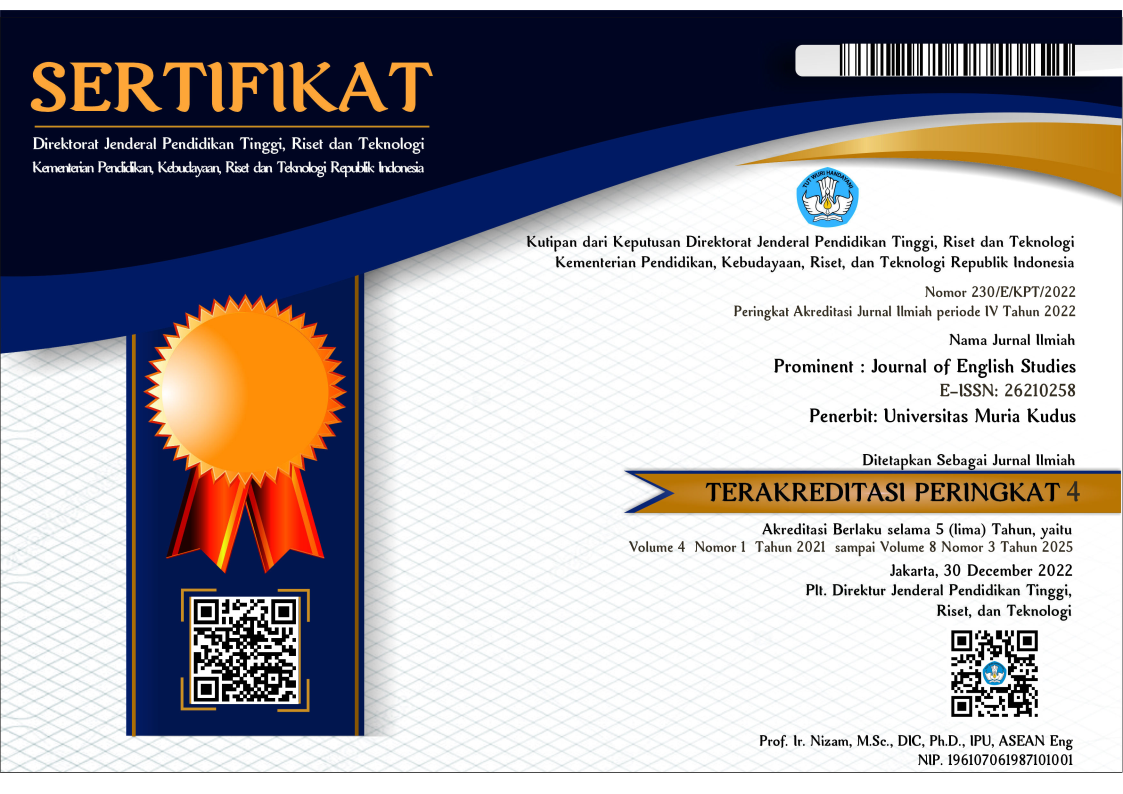An Analysis of Implicature in Drew Lynch's Stand-Up Comedy
Abstract
Keywords
Full Text:
PDFReferences
Ahmed, M., & Shazali, M. (2010). The interpretation of implicature: A comparative study between implicature in linguistics and journalism. Journal of language teaching and research, 1(1), 35-43.
Bach, K. (2010). Impliciture vs explicature: What’s the difference?. In Explicit communication: Robyn Carston’s pragmatics (pp. 126-137). London: Palgrave Macmillan UK.
Carston, Robyn 1988: Implicature, Explicature, And Truth-Theoretic Semantics. In R. M.Kempson (Ed.), Mental Representations: The Interface Between Language and Reality. Cambridge, Eng.
Fawaida, A. (2018) Humor Types and Grice’s Maxim In The SITCOM Comedy “The BigBang Theory”. Universitas Islam Negeri Maulana Malik Ibrahim).
Fitriani, S. S., Nasir, C., & Fonna, F. F. (2020). Pragmatic perspectives of verbal humor in an American sitcom. Humanities & Social Sciences Reviews, 8(3), 49-55.
Grice, H. P. (1975). Logic and conversation. Syntax and semantics, 3, 43-58.
Hardianti, W.N, Indah, R.N. (2020). Disfluences In Stand-Up Comedy: A PsycholinguisticAnalysis on Drew Lynch’s Stuttering. LEKSEMA: Jurnal Bahasa Dan Sastra. H. P. Grice. Logic And Conversation. University Of California, Berkeley.
Jaufillaili, J. (2017). The Analysis of Conversational Implicatures and Directness Level of Politeness in Comic Strips. Academic Journal Perspective: Education, Language, and Literature, 5(2), 109-118.
Jipang, P. A. (2019). Stuttering Found Within Drew Lynch’s Performances On America’s Got Talent 2015 And Its Relation With Speech Production (Doctoral dissertation, STATE ISLAMIC INSTITUTE).
Kamensky, M.V, Lomteva, T.N. (2018) Humorous Effect as The Linguistic, Cultural, And Pragmatic Basis Of Forming Public Opinion In Journalistic Discourse.
Lynch Morris, A. (2010). Native American stand-up comedy: Epideictic strategies in the contact zone. Rhetoric Review, 30(1), 37-53.
Nugraheni, Y. (2010, January). Analisis implikatur pada naskah film Harry Potter and The Goblet of Fire. In prosiding seminar nasional & internasional (Vol. 3, No. 1).
Nur, Z. L. (2016). An Analysis of Implicature in Fast Furious Movie Based on Relevance Theory (Doctoral dissertation, DIponegoro University).
Nurhaliza, S., & Sahri, Z. (2021). Implicature in Saikiran’S Stand Up Comedy Script Dark Skin and Getting Married. Journal of Language, 3(2), 114-123.
Qiu, J. (2019). Pragmatic Analysis of Verbal Humor in Friends-Based on Cooperative Principle. Theory and Practice in Language Studies, 9(8), 935-940.
Rolesta, I. (2016). Implicature analysis on stand-Up comedy Indo Malang (Doctoral dissertation, Universitas Negeri Islam Maulana Malik Ibrahim).
Rosasenja, A. S. (2012). An Analysis On Breaking Maxims In Verbal Humor Of Sitcom Friends And The Acceptability Of Its Indonesian Subtitles (Doctoral dissertation, SANATA DHARMA UNIVERSITY).
Saputri, A. R. (2018). Stuttering Language Disorder Of Stand-Up Comedian Off-Stage Speech. Paradigm, 1(2), 143-152.
Taufiqurrahman, F. (2013). Producing Humour Effect in the Standup Comedy Indonesia by Raditya Dika at “Comedy Cafe Kemang”(July 13th, 2011). Lantern (Journal on English Language, Culture and Literature), 2(2), 6-24.
Utami, I. I. (2018). Strategi Humor pada Acara Stand Up Comedy. Adabiyyāt: Jurnal Bahasa dan Sastra, 2(2), 219-245DOI: https://doi.org/10.24176/pro.v8i2.13981
Refbacks
- There are currently no refbacks.

This work is licensed under a Creative Commons Attribution-ShareAlike 4.0 International License.
Prominent Journal of English Studies is licensed under a Creative Commons Attribution-ShareAlike 4.0 International License.
Dedicated to:

in Collaboration with APSPBI:





